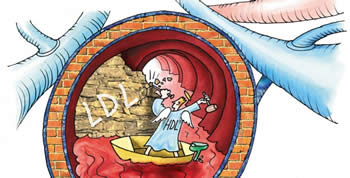Difference between Good and Bad Cholesterol
Key Difference: There is no such thing as good cholesterol or bad cholesterol. High levels of cholesterol and Low-density lipoproteins (LDL) are considered to have a bad effect on the body. While, low levels of cholesterol and high levels of high-density lipoproteins protect the heart against diseases. LDL are responsible for carrying cholesterol from the liver to the blood stream, while HDL are responsible for carrying cholesterol from the blood stream to the liver.
 The significant rise of obesity in the world has caused people to stop intake of certain kinds of food due to the cholesterol present in the food. May people are also shifting to vegan or vegetarian diets to limit the intake of bad cholesterol in their diet. This is mainly because of the shift to eating healthier and living a healthier life. Many such people do no understand that cholesterol is an important component and is required by body cells for producing other essential substances such as Pre-vitamin D, Testosterone, Estrogen, Progesterone, etc. Completely cutting out cholesterol is bad, also cholesterol itself is not bad. Let’s understand this further.
The significant rise of obesity in the world has caused people to stop intake of certain kinds of food due to the cholesterol present in the food. May people are also shifting to vegan or vegetarian diets to limit the intake of bad cholesterol in their diet. This is mainly because of the shift to eating healthier and living a healthier life. Many such people do no understand that cholesterol is an important component and is required by body cells for producing other essential substances such as Pre-vitamin D, Testosterone, Estrogen, Progesterone, etc. Completely cutting out cholesterol is bad, also cholesterol itself is not bad. Let’s understand this further.
There is no good cholesterol or bad cholesterol; there is only one type of cholesterol. The terms good cholesterol and bad cholesterol comes from the transport systems or the proteins that transport the cholesterol between the liver and the bloodstream. These are known as high-density lipoprotein and low-density lipoprotein. The two protein molecules are carriers for the cholesterol. Cholesterol is a waxy fat-like substance that is produced in the liver and is essential for the production of different substances in the body. In addition to being produced by the liver, cholesterol is also found in other foods that are consumed such as poultry, meat, dairy products, etc. Our body requires a limited amount of cholesterol in the body, which ironically also helps digest fat. However, high amounts of cholesterol prove to become deadly by increasing chances of diseases. Since, cholesterol cannot be digested; it remains in the blood stream.
Now, protein is responsible for the transfer of the cholesterol to the blood stream and from the blood stream to the liver, where it is disposed off. High-density lipoprotein molecules are responsible for transporting the cholesterol from the blood stream and tissues to the liver, while Low-density lipoprotein is responsible from transporting the cholesterol from the liver to the blood stream and different tissues. The amount of cholesterol present in the blood stream determines the blood cholesterol level of the person. Each person should have a significant amount of HDL and LDL in the body. Higher and lower levels of both disrupt the stabilization of the internal system.
Now, if a person lives a laid-back life and dines on fatty, high-cholesterol foods, then the person has a higher level of blood cholesterol and higher levels of LDL in the system. More cholesterol is added to the blood stream, which flows with the blood through the veins and gets deposited near arteries. These cholesterol deposits harden to become plague constricting blood flow through that vein or artery. If a person lives a healthy life style with low-cholesterol diet, then they have a moderate level of blood cholesterol and higher levels of HDL. The excess cholesterol is carried to the liver and disposed off properly. The less cholesterol in the system means less will get deposited in the veins and arteries.
It is often confusing for many people which has high levels of cholesterol and which does. Any fatty foods are often high cholesterol. However, if skin is removed from meat, then the meat has moderate amounts of consumable cholesterol. Low cholesterol diet can also include fruits and vegetables, which also have low amounts of cholesterol. It is not always best to follow any trend, and people should first consult their doctors and nutritionists before completely changing their diets and lifestyles. Some people may not even have high levels of cholesterol.
Image Courtesy: smartlivingnetwork.com









Add new comment